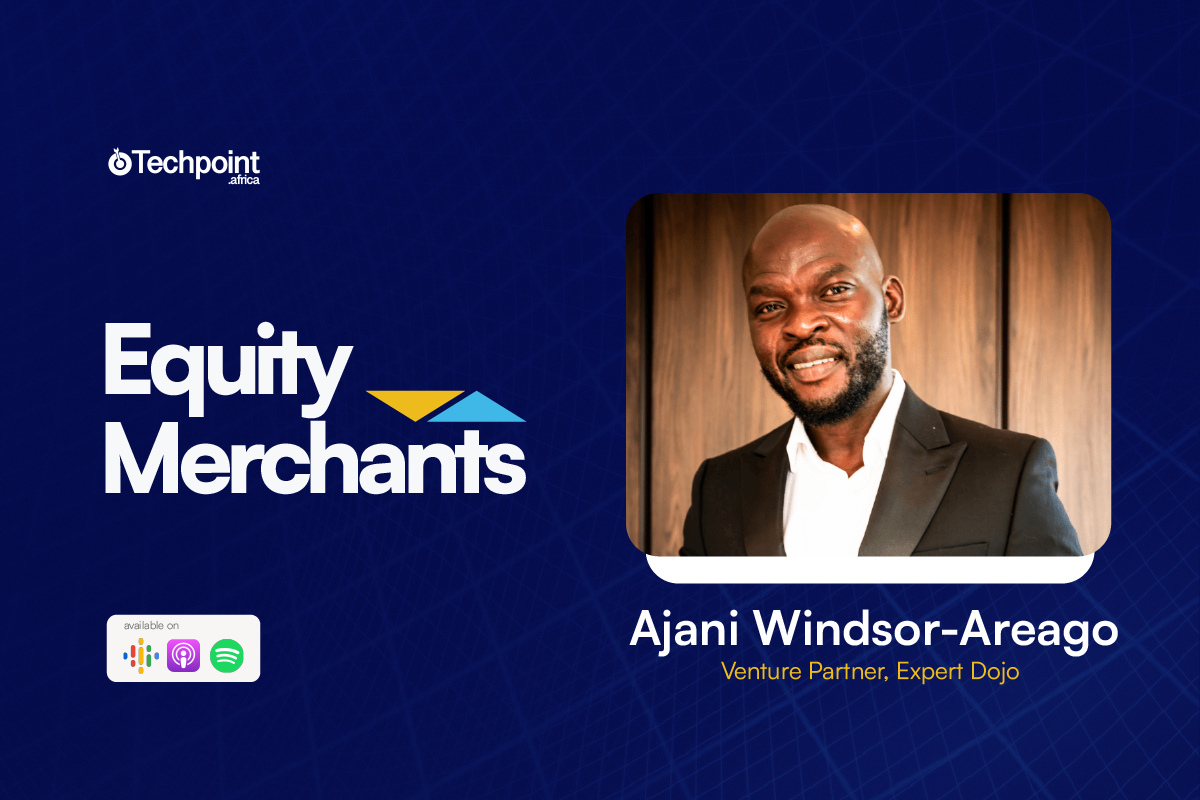Date: April 5, 2023

In 2018, Ajani Windsor-Areago got his first professional introduction to venture capital when he joined Platform Capital as its head of ventures. Today, he’s a venture partner at Expert Dojo, a venture capital firm that invests in post-revenue startups from the pre-seed to Series A stage.
Beyond investing in post-revenue startups, Expert Dojo invests in minority founders, including women and black founders.
Expert Dojo initially invests between $50,000 to $100,000 in startups and follows up with $1 million if they get to Series A.
Black VCs alone cannot close the funding gap
Minority groups such as female and black founders have historically raised less venture capital funding. For example, the $5 billion raised by African startups only makes up 1.1% of global VC funding. Similarly, only 4% of VC funding went to female-led startups in Africa.
Depending on who you speak with, the little amount of funding to these groups is affected by the tendency of venture capitalists to invest in people who look like them, but Ajani holds a slightly different opinion. While he agrees that more black VCs would help in increasing the amount of funding going to black founders, he argues that it is not enough, as not all black investors will invest in black founders.
“Even when black VCs raise funds, they do not always invest in black companies. I was checking the stats the other day, and a particular VC based in LA raised a huge fund based on the thesis that they were going to be invested in black companies.
“They invested in over 134 companies last year, and only 14 of them were black. There’s another VC based in LA. They invested in 38 companies last year; only three were black. And these are black VCs who raised their whole fund telling people we invest in black founders. So even when you allocate money to black VCs, it still doesn’t solve the problem.”
Instead, he claims that Blacks and Caucasians do not know themselves well enough to do business together.
“People invest in people who look like them. People like to do business with people who look like them. I think the disparity is that in America, Blacks and Caucasians don’t know each other that well. We don’t communicate with each other, we don’t speak to each other. We don’t understand each other’s culture.
“So for me, let’s move it away from the business. Let’s get to know each other on a personal level. I think when we get to know each other on a personal level, business becomes easy.”
Although Expert Dojo has invested in fintech startups, Ajani decries the extreme focus on funding fintech startups, arguing that founders see that and are less motivated to build innovative products.
“Go on Crunchbase and see some of the companies raising money. It’s shocking to see that every single thing is fintech. There’s nothing innovative coming out. The moment founders see that this is where the money is going, innovation is gone. Everyone is building things specifically to raise money, not to solve problems anymore. We need African founders solving problems again, not just building something to raise money.”
Stemming this trend he says depends on whether VCs are willing to learn about and fund local problems, rather than invest in the same vehicles as every other person.
When investing in startups, Ajani says that Expert Dojo’s equity demands differ depending on the startup. However, he says they fall between 3% and 7%. With more than five years of experience investing in startups, he points out that one problem he has encountered when dealing with founders is being honest about their numbers.
“Founders everywhere have the problem of trying to pitch a VC with numbers that are not real. We actually say to founders, ‘Look, tell us the truth. What are your numbers? What problems are you facing?'”
Since they invest up to the pre-seed stage, helping portfolio companies grow to the point where they can raise a Series A is high on their list of priorities. Ajani explains some of the ways they help startups do this, including preparing appropriate market-entry strategies, examining their pricing strategies, and introducing them to other VCs who can invest in them.
How investors in Africa think about exits
An important aspect of being a venture capitalist is identifying exit opportunities when investing. This could be through a public listing, a merger/acquisition, or selling one’s stake in the business to other investors or the startup’s management.
In a mature economic environment, there are numerous options for VCs, but in emerging markets like Africa, those options are fewer. Regardless, VCs must figure out a way to exit their investments with healthy returns to boot.
Ajani points out that Western investors with little understanding of the local economic landscape may be unaware of the existing exit opportunities. For him, though, speaking to local investors has shed more light on how investors can exit and he points out that an exit for many investors is selling off their stakes at the Series A level.
“A lot of the Western VCs invest in Africa without having an exit strategy. There’s no IPO for you. What a lot of VCs in the West do not understand is that when a company reaches Series A in Africa, that’s an exit for someone who invested in the pre-seed. I’m speaking to a lot of the African VCs and they’re teaching us how to exit businesses on the continent.”
Although many people will argue that the venture capital slowdown in 2022 led to slashed valuations, Ajani maintains that was not the case as current valuations present a more accurate picture of a startup’s value.
“I do not believe valuations have been slashed. I think valuations have become real. Previously, people just came up with a valuation; they just pulled numbers from the sky. But now people are doing their due diligence.
“A lot of the time, many VCs don’t do any real diligence. They do what I call momentum investing. I’m really happy with what the market is now because people are actually doing real due diligence. The market is real and valuations have returned to what they’re supposed to be.”
The importance of storytelling when raising funds
It was Margaret Atwood, author of The Handmaid’s Tale, who said, “you’re never going to kill storytelling, because it’s built in the human plan. We come with it.”
Because of the difficulties that come with raising capital from venture capitalists, founders are always on the lookout for anything that gives them an advantage. For Ajani, storytelling is that advantage.
“Having a great product alone would not help you raise money if you cannot speak to the product,” he says. “Sometimes I see two types of founders. There’s the founder with a great product who cannot raise money and I see some founders who have really bad products but are very good at raising money because they understand the art of telling stories,” he adds.”
You can tell your personal story and tie it to how you arrived at that product. Merge it and make sure that the VC buys into you as a person because I can go with the cliché that VCs invest in people, not in businesses.”
https://techpoint.africa/2023/04/05/expert-dojo-ajani-areago/
